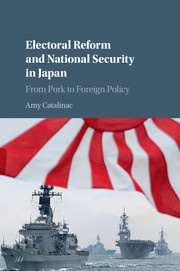Book contents
- Frontmatter
- Dedication
- Contents
- List of Tables
- List of Figures
- Acknowledgments
- 1 Introduction
- 2 Electoral Systems, Electoral Strategies, and National Security
- 3 Measuring Electoral Strategies with Thousands of Candidate Election Manifestos
- 4 Electoral Strategies Shifted from Pork to Policy
- 5 Electoral Strategies Shifted to National Security
- 6 Electoral Strategies of Opposition Focused on Policy
- 7 Impact on Security Policy
- 8 Conclusion
- References
- Index
5 - Electoral Strategies Shifted to National Security
Published online by Cambridge University Press: 05 February 2016
- Frontmatter
- Dedication
- Contents
- List of Tables
- List of Figures
- Acknowledgments
- 1 Introduction
- 2 Electoral Systems, Electoral Strategies, and National Security
- 3 Measuring Electoral Strategies with Thousands of Candidate Election Manifestos
- 4 Electoral Strategies Shifted from Pork to Policy
- 5 Electoral Strategies Shifted to National Security
- 6 Electoral Strategies of Opposition Focused on Policy
- 7 Impact on Security Policy
- 8 Conclusion
- References
- Index
Summary
National security and territorial disputes are the lifeblood of politicians these days.
Chapter 1 described the puzzling turnaround in attention to national security by conservative Japanese politicians in 1997. Chapter 2 argued that this turnaround is best explained by a shift in their electoral strategies from pork for groups of voters in their respective districts to broad policy issues such as national security, brought about by electoral reform to the House of Representatives (HOR) in 1994. Chapter 3 explained how candidate election manifestos and quantitative text analysis were used to obtain measures of the degree to which each of the 7,497 serious candidates competing in the eight HOR elections held between 1986 and 2009 were relying on pork, policy, and within the policy category, national security policy. Chapter 4 used those measures to test Hypothesis 1, which contended that conservative candidates adopted electoral strategies dominated by pork prior to electoral reform, Hypothesis 2, which contended that conservative candidates facing higher levels of intraparty competition adopted electoral strategies of more pork than conservative candidates facing lower levels of intraparty competition, and Hypothesis 3, which contended that conservative candidates adopted electoral strategies dominated by broad policy issues like national security after electoral reform.
This chapter focuses exclusively on the role of national security in their electoral strategies. It proceeds as follows. First, it presents a descriptive account of National Security Policy (Topic 6) and explains why the level of discussion of this topic in the manifestos of conservative candidates contesting these eight elections provides a reliable estimate of the degree to which these candidates focused on national security in these elections. Second, it demonstrates that these candidates adopted electoral strategies comprised of no national security under the old electoral system and switched to adopting electoral strategies comprised of national security under the new. It also provides evidence that as expected, national security expertise was not something to flaunt under the old electoral system, but something to hide.
While the evidence presented in this and the previous chapter supports my claim that conservative politicians started paying attention to national security after 1997 because their electoral strategies changed, both the shift in strategies and turnaround in attention to national security are consistent with a number of alternative hypotheses, none of which have anything to do with electoral reform.
- Type
- Chapter
- Information
- Electoral Reform and National Security in JapanFrom Pork to Foreign Policy, pp. 134 - 166Publisher: Cambridge University PressPrint publication year: 2016

